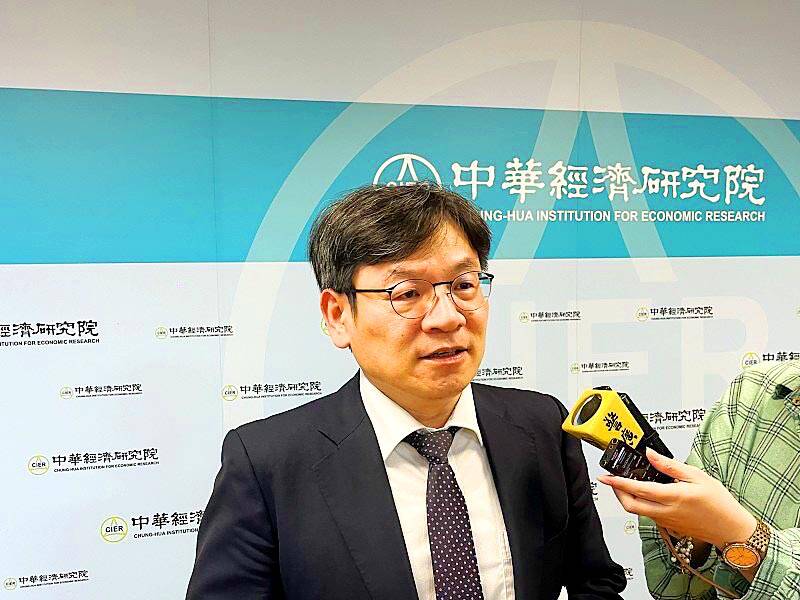Chung-Hua Institution for Economic Research (CIER, 中華經濟研究院) yesterday raised its forecast for Taiwan’s GDP growth from 3.1 percent to 3.38 percent, as exports could receive a bigger boost from global artificial intelligence (AI) demand.
“The nation’s exports would start to set sail from this quarter, thanks to better order visibility,” CIER president Yeh Chun-hsien (葉俊顯) said.
Exports, the main growth driver that accounts for 60 percent of GDP, would shift from a 9.8 percent decline last year to a 7.89 percent increase this year, as inventory adjustments come to a close, the think tank said.

Photo: Hsu Tzu-ling, Taipei Times
The low base last year would also help and explain why the recovery momentum would ease off quarter by quarter, Yeh said.
GDP growth is predicted to reach 5.57 percent last quarter, and to slow to 3.55 percent this quarter, 3 percent next quarter and 1.66 percent in the final quarter, he added.
Global AI demand has been stronger than expected and would ramp up businesses of local tech firms on its supply chain, Yeh said.
Revenue from AI server chips would more than double this year and would account for 20 percent of overall sales by 2028 from a contribution that is currently in the low teens, Taiwan Semiconductor Manufacturing Co (TSMC, 台積電) told investors on Thursday.
Yeh said the upward revision also aims to reflect an increase in government expenditure that would expand 2.68 percent this year to build up national defense and armament procurements.
Private consumption would register a healthy 2.09 percent gain, falling from an 8.32 percent uptick, as demand for outbound travel holds sturdy, especially after an earthquake which measured a 7.2 on the Richter scale jolted Hualien on April 3 and is expected to hinder tourism in eastern Taiwan, Yeh added.
CIER has a dim view on private investment, saying that the GDP component would shrink 0.2 percent this year after a deep 11.6 percent retreat last year.
Local firms remain cautious about capital spending, as the US Federal Reserve appears unlikely to cut interest rates anytime soon and Taiwan’s central bank last month unexpectedly raised borrowing costs by 0.125 percentage points, Yeh said.
Sticky inflation and spiking geopolitical tensions lent support to a conservative approach, he added.
CIER is looking at an inflation of 2.3 percent, which is above the central bank’s 2 percent alarm, mitigating little from a 2.49 percent rise last year.

Taiwan will prioritize the development of silicon photonics by taking advantage of its strength in the semiconductor industry to build another shield to protect the local economy, National Development Council (NDC) Minister Paul Liu (劉鏡清) said yesterday. Speaking at a meeting of the legislature’s Economics Committee, Liu said Taiwan already has the artificial intelligence (AI) industry as a shield, after the semiconductor industry, to safeguard the country, and is looking at new unique fields to build more economic shields. While Taiwan will further strengthen its existing shields, over the longer term, the country is determined to focus on such potential segments as

UNCERTAINTY: Innolux activated a stringent supply chain management mechanism, as it did during the COVID-19 pandemic, to ensure optimal inventory levels for customers Flat-panel display makers AUO Corp (友達) and Innolux Corp (群創) yesterday said that about 12 to 20 percent of their display business is at risk of potential US tariffs and that they would relocate production or shipment destinations to mitigate the levies’ effects. US tariffs would have a direct impact of US$200 million on AUO’s revenue, company chairman Paul Peng (彭雙浪) told reporters on the sidelines of the Touch Taiwan trade show in Taipei yesterday. That would make up about 12 percent of the company’s overall revenue. To cope with the tariff uncertainty, AUO plans to allocate its production to manufacturing facilities in

COLLABORATION: Given Taiwan’s key position in global supply chains, the US firm is discussing strategies with local partners and clients to deal with global uncertainties Advanced Micro Devices Inc (AMD) yesterday said it is meeting with local ecosystem partners, including Taiwan Semiconductor Manufacturing Co (TSMC, 台積電), to discuss strategies, including long-term manufacturing, to navigate uncertainties such as US tariffs, as Taiwan occupies an important position in global supply chains. AMD chief executive officer Lisa Su (蘇姿丰) told reporters that Taiwan is an important part of the chip designer’s ecosystem and she is discussing with partners and customers in Taiwan to forge strong collaborations on different areas during this critical period. AMD has just become the first artificial-intelligence (AI) server chip customer of TSMC to utilize its advanced

Chizuko Kimura has become the first female sushi chef in the world to win a Michelin star, fulfilling a promise she made to her dying husband to continue his legacy. The 54-year-old Japanese chef regained the Michelin star her late husband, Shunei Kimura, won three years ago for their Sushi Shunei restaurant in Paris. For Shunei Kimura, the star was a dream come true. However, the joy was short-lived. He died from cancer just three months later in June 2022. He was 65. The following year, the restaurant in the heart of Montmartre lost its star rating. Chizuko Kimura insisted that the new star is still down